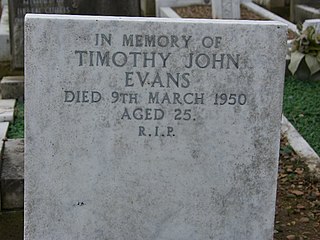Innocence Project, Inc. is a 501(c)(3) nonprofit legal organization that is committed to exonerating individuals who have been wrongly convicted, through the use of DNA testing and working to reform the criminal justice system to prevent future injustice. The group cites various studies estimating that in the United States between 1% and 10% of all prisoners are innocent. The Innocence Project was founded in 1992 by Barry Scheck and Peter Neufeld who gained national attention in the mid-1990s as part of the "Dream Team" of lawyers who formed part of the defense in the O. J. Simpson murder case.

A miscarriage of justice occurs when an unfair outcome occurs in a criminal or civil proceeding, such as the conviction and punishment of a person for a crime they did not commit. Miscarriages are also known as wrongful convictions. Innocent people have sometimes ended up in prison for years before their conviction has eventually been overturned. They may be exonerated if new evidence comes to light or it is determined that the police or prosecutor committed some kind of misconduct at the original trial. In some jurisdictions this leads to the payment of compensation.
Kirk Noble Bloodsworth is a former Maryland waterman and the first American sentenced to death to be exonerated post-conviction by DNA testing.
Wrongful execution is a miscarriage of justice occurring when an innocent person is put to death by capital punishment. Cases of wrongful execution are cited as an argument by opponents of capital punishment, while proponents say that the argument of innocence concerns the credibility of the justice system as a whole and does not solely undermine the use of the death penalty.
The Georgia Innocence Project is a non-profit corporation based in Atlanta, Georgia, United States. Its mission "is to free the wrongly prosecuted through DNA testing, to advance practices that minimize the chances that others suffer the same fate, to educate the public that wrongful convictions are not rare or isolated events, and to help the exonerated rebuild their lives."
This is a list of notable overturned convictions in the United States.
In United States federal criminal law, the Innocence Protection Act is the first federal death penalty reform to be enacted. The Act seeks to ensure the fair administration of the death penalty and minimize the risk of executing innocent people. The Innocence Protection Act of 2001, introduced in the Senate as S. 486 and the House of Representatives as H.R. 912, was included as Title IV of the omnibus Justice for All Act of 2004, signed into law on October 30, 2004 by President George W. Bush as public law no. 108-405.
Earl Washington Jr. is a former Virginia death-row inmate, who was fully exonerated of murder charges against him in 2000. He had been wrongfully convicted and sentenced to death in 1984 for the 1982 rape and murder of Rebecca Lyn Williams in Culpeper, Virginia. Washington has an IQ estimated at 69, which classifies him as intellectually disabled. He was coerced into confessing to the crime when arrested on an unrelated charge a year later. He narrowly escaped being executed in 1985 and 1994.

Clarence Arnold Elkins Sr. is an American man who was wrongfully convicted of the 1998 rape and murder of his mother-in-law, Judith Johnson, and the rape and assault of his wife's niece, Brooke Sutton. He was convicted solely on the basis of the testimony of his wife's six-year-old niece who testified that Elkins was the perpetrator.
The National Registry of Exonerations is a project of the University of Michigan Law School, Michigan State University College of Law and the University of California Irvine Newkirk Center for Science and Society. The Registry was co-founded in 2012 with the Center on Wrongful Convictions at Northwestern University School of Law to provide detailed information about known exonerations in the United States since 1989. As of February 6, 2020, the Registry has 2,551 known exonerations in the United States since 1989. The National Registry does not include more than 1,800 defendants cleared in 15 large-scale police scandals that came to light between 1989 and March 7, 2017, in which officers systematically framed innocent defendants.
In law, post conviction refers to the legal process which takes place after a trial results in conviction of the defendant. After conviction, a court will proceed with sentencing the guilty party. In the American criminal justice system, once a defendant has received a guilty verdict, they can then challenge a conviction or sentence. This takes place through different legal actions, known as filing an appeal or a federal habeas corpus proceeding. The goal of these proceedings is exoneration, or proving a convicted person innocent. If lacking representation, the defendant may consult or hire an attorney to exercise his or her legal rights.
The Illinois Innocence Project, a member of the national Innocence Project network, is a non-profit legal organization that works to exonerate wrongfully convicted people and reform the criminal justice system to prevent future injustice.

The California Innocence Project is a non-profit based at California Western School of Law in San Diego, California, United States, which provides pro bono legal services to individuals who maintain their factual innocence of crime(s) for which they have been convicted. It is an independent chapter of the Innocence Project. Its mission is to exonerate wrongly convicted inmates through the use of DNA and other evidences.

Investigating Innocence is a nonprofit wrongful conviction advocacy organization that provides criminal defense investigations for inmates in the United States. Investigating Innocence was founded in 2013 by private investigator Bill Clutter to assist nationwide Innocence Project groups in investigating innocence claims. "Once we have a case that meets our criteria, we'll put private investigators to work on it. A lot of these cases need investigators," said Kelly Thompson, executive director of Investigating Innocence. Prior to his work on Investigating Innocence, Clutter was one of the founders of the Illinois Innocence Project. Investigating Innocence also has a board composed of exonerees that reviews incoming cases.
The Nebraska Innocence Project was a member organization Nebraska-based chapter of a U.S non-profit organization called the Innocence Project, located in Omaha, Nebraska. In 2019, the Nebraska Innocence Project folded into the Midwest Innocence Project. The Midwest Innocence Project's mission is to educate about, advocate for, and obtain and support the exoneration and release of wrongfully convicted people in Nebraska, Iowa, Kansas, Missouri, and Arkansas. The Nebraska chapter was founded in 2005 by a group of volunteers who were inspired by the work of Barry Scheck and Peter Neufeld, founders of the Innocence Project in 1992. The Midwest Innocence Project (MIP) was founded in 2001 through the UMKC School of Law and is also part of the national Innocence Network.

Nicholas James Yarris is an American writer and storyteller who spent 22 years on death row in Pennsylvania after being wrongfully convicted of murder.

Alissa Leanne Bjerkhoel is an American litigation coordinator at the California Innocence Project (CIP), a law school clinic that investigates cases of factual innocence while training law students. Bjerkhoel was born in Truckee, California, and later graduated from California Western School of Law (CWSL) after previously obtaining a B.A. degree She has been an attorney with CIP since 2008. Bjerkhoel has served as counsel for CIP on numerous criminal cases, and achieved the legal exoneration of a number of convicted prisoners. Bjerkhoel serves as CIP's in-house DNA expert and also serves as a panel attorney with the nonprofit law firms Appellate Defenders, Inc. (ADI) and Sixth District Appellate Program (SDAP). She is a member of the American Academy of Forensic Sciences. Bjerkhoel has won a number of awards.

Bill Clutter is an American private investigator, wrongful conviction advocate, and author. He is the co-founder of the Illinois Innocence Project and founder of the national wrongful conviction organization Investigating Innocence. His work on the Donaldson v. Central Illinois Public Service Company case led him to write the book Coal Tar: How Corrupt Politics and Corporate Greed Are Killing America's Children, which is the story of an epidemic of neuroblastoma in Taylorville, IL caused by exposure to coal tar.




